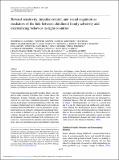Reward sensitivity, impulse control, and social cognition as mediators of the link between childhood family adversity and externalizing behavior in eight countries
Publication Date
2017-12Author
Jennifer E Lansford, Jennifer Godwin, Marc H Bornstein, Lei Chang, Kirby Deater-Deckard, Laura Di Giunta, Kenneth A Dodge, Patrick S Malone, Paul Oburu, Concetta Pastorelli, Ann T Skinner, Emma Sorbring, Laurence Steinberg, Sombat Tapanya, Liane Peña Alampay, Liliana Maria Uribe Tirado, Suha M Al-Hassan, Dario Bacchini
Metadata
Show full item recordAbstract/
Using data from 1,177 families in eight countries (Colombia, Italy, Jordan, Kenya, the Philippines, Sweden, Thailand, and the United States), we tested a conceptual model of direct effects of childhood family adversity on subsequent externalizing behaviors as well as indirect effects through psychological mediators. When children were 9 years old, mothers and fathers reported on financial difficulties and their use of corporal punishment, and children reported perceptions of their parents’ rejection. When children were 10 years old, they completed a computerized battery of tasks assessing reward sensitivity and impulse control and responded to questions about hypothetical social provocations to assess their hostile attributions and proclivity for aggressive responding. When children were 12 years old, they reported on their externalizing behavior. Multigroup structural equation models revealed that across all eight countries, childhood family adversity had direct effects on externalizing behaviors 3 years later, and childhood family adversity had indirect effects on externalizing behavior through psychological mediators. The findings suggest ways in which family-level adversity poses risk for children's subsequent development of problems at psychological and behavioral levels, situated within diverse cultural contexts.
Collections
- Department of Psychology [216]

